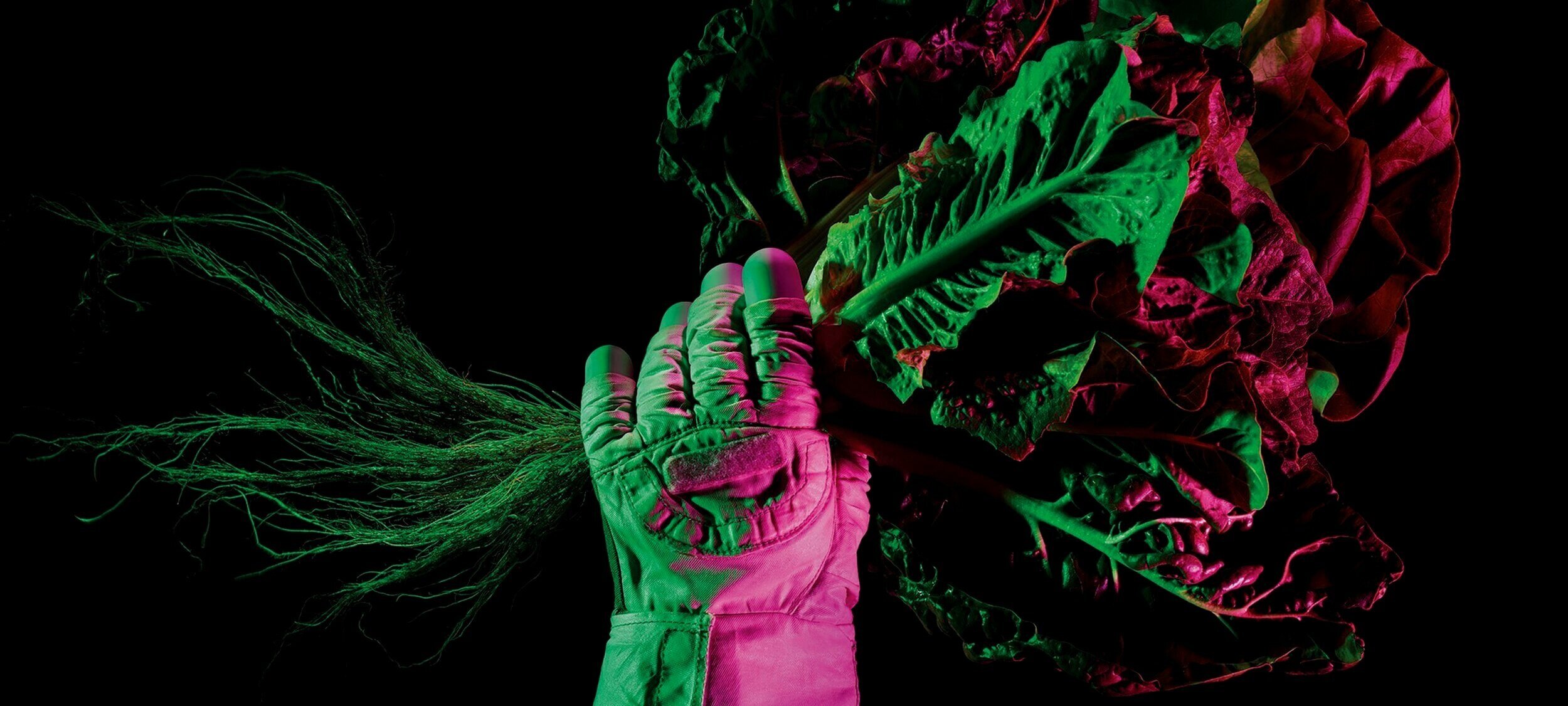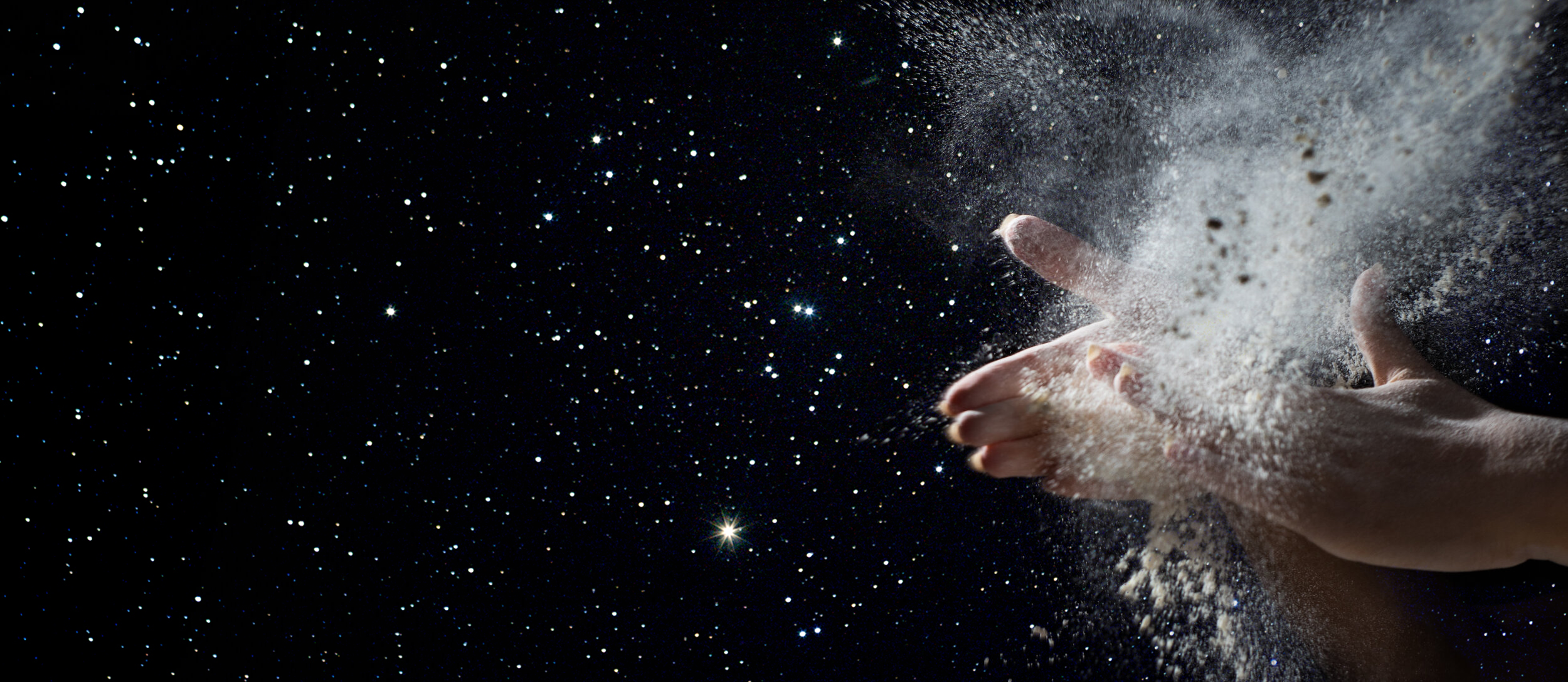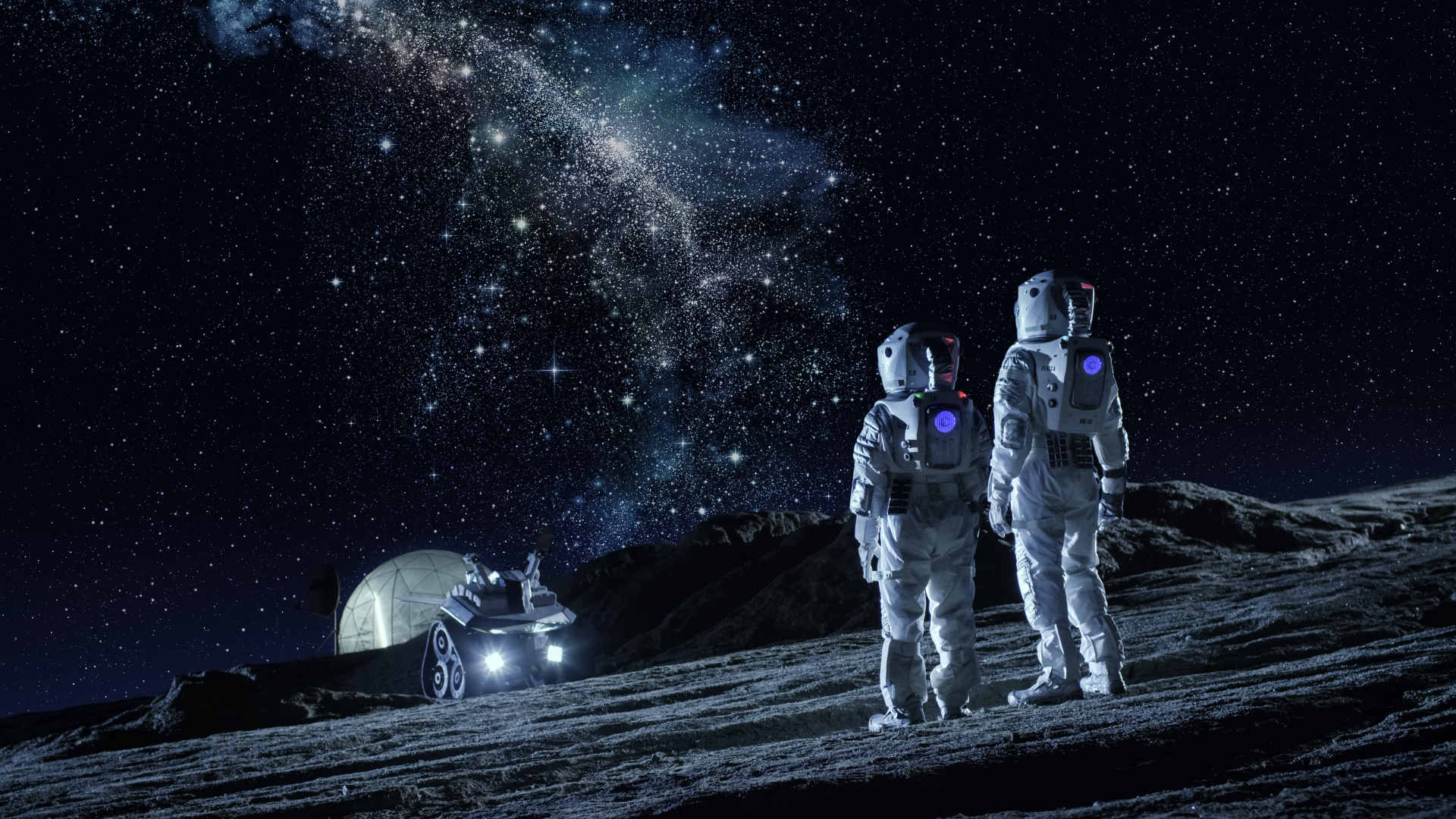
THE DEEP SPACE FOOD CHALLENGE
Food for the next frontier.
Challenge Mission
Good food for healthier, happier humans in space and on Earth.
The Deep Space Food Challenge is an international competition where NASA offers prize purse awards to U.S. teams and recognition to international teams. Teams are invited to create novel and game-changing food technologies or systems that require minimal inputs and maximize safe, nutritious, and palatable food outputs for long-duration space missions, and which have potential to benefit people on Earth.
Hungry for More
In space
Though there are many food systems on Earth that may offer benefits to space travelers, the ability of these systems to meet spaceflight demands has not yet been established.
Types and durations of future lunar missions constantly evolve and mature based on new technological advances and scientific input.
Space agencies need to address long-duration lunar missions and how to provide future lunar crews with safe, nutritious food while in lunar orbit or on the lunar surface.
On Earth
Food insecurity is a significant chronic problem on Earth in urban, rural and harsh environments and communities.
Disasters can also disrupt supply chains, on which all people depend, and further aggravate food shortages.
Efficient use of volume, water, and other inputs for producing food could enable technologies with reduced impact on the resources needed for food production here on Earth, especially in extreme environments and resource-scarce regions.
Challenge Goals
Our focus is on providing future space explorers and people on Earth nutritious foods they will enjoy.
The Deep Space Food Challenge will identify food production technologies that can:
Help fill food gaps for a crew of four for a three-year round-trip mission with no resupply
Improve the accessibility of food on Earth, in particular, via production directly in urban centers and in remote and harsh environments
Achieve the greatest amount of food output with minimal inputs and minimal waste
Create a variety of palatable, nutritious, and safe foods that requires little processing time for crew members
This Challenge seeks to incentivize teams to develop novel technologies and/or systems for food production that need not meet the full nutritional requirements of future crews, but can contribute significantly to and be integrated into a comprehensive food system.

Up to $1,500,000 in NASA Prizes for Phase 3
Phase 3 teams will build a full-scale food production technology and demonstrate the technology at a designated facility.
NASA Prize Purse for U.S. Teams
Each U.S. Team that proves technology readiness as determined by the Judging Panel and is approved to ship their food production technology to the demonstration location will be awarded $50,000 USD.
Up to one top scoring U.S. Team will be named the U.S. winner of Phase 3 and will receive $750,000 USD from NASA.
Up to two U.S. runners up will each receive $250,000 USD from NASA.
NASA Recognition for International Teams
Up to one top scoring International Team will be recognized as the international winner of Phase 3
Up to two international runners up will also be recognized.
Challenge Timeline
-
SEPTEMBER 15, 2023
Phase 3 Opens
-
OCTOBER 6, 2023
Intent to Compete and Development Schedule Due
-
SEPTEMBER 2023 - APRIL 2024
Teams scale their technologies and work towards technology readiness for the demonstration
-
JANUARY 16, 2024
Draft Document Package Due
-
APRIL 8,2024
Final Document Package Due
-
APRIL 16-17, 2024
Virtual Walkthroughs
-
APRIL 20-25, 2024
Final Determination of Technology Readiness
-
MAY 20-25, 2024
Teams deliver the food production systems to the designated facility and prepare for the demonstration
-
MAY 27-JUNE 1, 2024
Teams Arrive at the Starlab Ground Lab US (SGL-US) for Technology Setup
-
JUNE 3-4, 2024
Simunaut Crew Operational Training
-
JUNE 5 - JULY 31, 2024
Demonstration Period
June 5-18 - Ground Test Validation
June 19-July 31 - Simulated Flight Operations -
AUGUST 5-16, 2024
Judging Panel Evaluation & Final Summit to determine winners
-
AUGUST 15-16, 2024
Phase 3 Winners Announced & Industry Day Event
-
AUGUST TBD, 2024
Teams Remove Technologies from the Starlab Ground Lab US (SGL-US)

How to Compete
New teams cannot be formed, but Phase 3 teams may add members. Potential participants should:
Review the participation Rules and Eligibility Requirements.
Complete and submit the Expression of Interest form.
Qualified participants will be contacted to supply proof of eligibility to participate.
Submitted information will be verified and Teams will be notified of your interest.
Existing Phase 3 teams may adopt new members at their discretion.
Frequently Asked Questions
+ What is the Deep Space Food Challenge?
The Deep Space Food Challenge is a public competition that seeks to create novel food production technologies or systems that require minimal inputs and maximize safe, nutritious, and palatable food outputs for long-duration space missions, and have potential to benefit people on Earth.
+ Why is this Challenge focused on food production?
Early lunar missions will begin by using prepackaged food systems similar to those in use on the International Space Station (ISS) today, but extending the duration of lunar missions requires reducing resupply dependency on Earth until a food system is ready to support a mission to Mars. Thus, testing a sustainable system on the Moon that meets lunar crews’ needs is a fundamental step for both lunar sustainability and Mars exploration. As part of this, NASA and the Canadian Space Agency (CSA) are focused on how to furnish crew members with a viable food system for all long duration planetary missions.
Food insecurity is also a significant chronic problem on Earth in urban, rural and harsh environments and communities. In places like the Arctic and Canada’s North, the cost of providing fresh produce on the shelves can be incredibly high. In addition, many northern communities can be accessed solely by aircraft or only receive infrequent shipments of food, often resulting in food of lesser quality. Solutions identified through this Challenge could support these harsh environments, and also support greater food production in other milder environments, including major urban centers where vertical farming, urban agriculture and other novel food production techniques can play a more significant role.
+ Who is conducting this Challenge?
Just as international collaborations have been key to the success of countless space missions, this Challenge represents a first of its kind collaboration between the National Aeronautics Space Administration (NASA), the Canadian Space Agency (CSA) and the Privy Council Office (PCO) in the organization of parallel challenges to answer the charge for each government. NASA is providing the NASA prize purse. Information on the Canadian Space Agency competition can be found at Impact Canada.
+ What is CSA’s role?
The Deep Space Food Challenge is a prize competition launched in parallel, in Canada by the Canadian Space Agency (CSA), and in the U.S. by the National Aeronautics and the Space Administration (NASA) Centennial Challenges Program. Interested Canadian Applicants are invited to apply through the Impact Canada website, and U.S. and international applicants are invited to apply through the U.S. website.
NASA and CSA will each organize and manage parallel challenges, with their own distinct rules, their own prizes and eligibility, but will synchronize some activities (e.g. webinars) and employ a shared challenge statement, shared goals and shared assessment criteria. CSA has no responsibility in NASA, and NASA has no responsibility in CSA.
+ Who is Methuselah Foundation?
Methuselah Foundation is a non-profit organization that strives to advance human health and longevity. They develop and partner with programs and organizations to accelerate breakthroughs in these areas. NASA has partnered with Methuselah Foundation as the Allied Organization to help execute the Deep Space Food Challenge. This is the second NASA Centennial Challenge competition administered by Methuselah Foundation, with the Vascular Tissue Challenge being the first.
+ What are the important dates for Phase 3 of the Deep Space Food Challenge?
| Date/Deadline | Event |
| September 15, 2023 | Phase 3 Opens |
| October 6, 2023 | Intent to Compete and Development Schedule Due |
| September 2023 - April 2024 | Teams scale their technologies and work towards technology readiness for the demonstration |
| January 16, 2024 | Draft Document Package Due |
| April 1, 2024 | Final Document Package Due |
| April 9-10, 2024 | Virtual Walkthroughs |
| April 16, 2024 | Final Determination of Technology Readiness |
| May 20-25, 2024 | Teams deliver the food production systems to the designated facility and prepare for the demonstration |
| May 27-June 1, 2024 | Teams Arrive at the Starlab Ground Lab US (SGL-US) for Technology Setup |
| June 3-4, 2024 | Simunaut Crew Operational Training |
| June 5 - July 31, 2024 | Demonstration Period June 5-18 - Ground Test Validation June 19-July 31 - Simulated Flight Operations |
| August 5-16, 2024 | Judging Panel Evaluation and Final Summit to determine winners |
| August TBD, 2024 | Phase 3 Winners Announced and Industry Day Event |
| August TBD, 2024 | Teams Remove Technologies from the Starlab Ground Lab US (SGL-US) |
CHALLENGE STRUCTURE
+ I’d like to participate – how do I get started?
Phase 3 does not have open regitration for new teams. All Phase 2 Winners are automatically granted entry into Phase 3 if still eligible. However, Phase 3 teams may add new qualified individuals and entities to their teams, which may be participants of prior Challenge phases.
All interested prospective team members must express interest through the Challenge website. Specific instructions for participation can be viewed here.
+ Do I have to participate in Phase 2 in order to participate in Phase 3?
Phase 3 does not have open regitration for new teams, but Phase 3 teams may include new eligible individuals and entities at their discretion.
+ How will submissions be assessed?
Teams’ submissions will be assessed by a panel of Judges and evaluated using a set of overall criteria and specific performance criteria as stated in the rules.
+ What can I win?
NASA Prize Purse for U.S. Teams - Each U.S. Team that proves technology readiness as determined by the Judging Panel and is approved to ship their food production technology to the demonstration location, will be awarded $50,000 USD.
Up to one (1) top scoring U.S. Team will be named the U.S. winner of Phase 3 and will receive $750,000 USD from NASA. Up to two (2) U.S. runners up will each receive $250,000 USD from NASA.
U.S. Teams must meet the eligibility requirements to participate in the Challenge and receive a prize award from NASA.
Recognition for International Teams - One top scoring International Team will be recognized as the international winner of Phase 3, and up to two (2) international runners up will also be recognized.
International Teams must meet the eligibility requirements to participate in the Challenge and be recognized as winners.International Teams are not eligible to be awarded prize money from NASA.
+ What happens to my intellectual property?
Neither NASA nor the Methuselah Foundation claim any intellectual property (IP) rights from the Teams’ submissions. All trade secrets, copyrights, patent rights, and software rights will remain with each respective Team.
| U.S. | International (non-Canadian) |
| To the extent the Team owns IP resulting from its participation in the Challenge, at the conclusion of the competition, and at NASA’s option and upon NASA’s instigation the Team agrees to negotiate in good faith with NASA for a grant of a nonexclusive, nontransferable, irrevocable license to practice or have practiced for or on behalf of the United States, the intellectual property throughout the world, at reasonable compensation, if NASA chooses to pursue such a license. | United States: To the extent the Team owns IP resulting from its participation in the Challenge, at the conclusion of the competition, and at NASA’s option and upon NASA’s instigation, the Team agrees to negotiate in good faith with NASA for a grant of a nonexclusive, nontransferable, irrevocable license to practice or have practiced for or on behalf of the United States, the intellectual property throughout the world, at reasonable compensation, if NASA chooses to pursue such a license. |
+ Who can I contact with questions or about my submission?
Please direct all questions to admin@deepspacefoodchallenge.org, and a member of our support team will respond as quickly as possible.
+ Who can I contact for more information about the Deep Space Food Challenge?
All questions related to participating and/or competing in the Challenge should be sent to admin@deepspacefoodchallenge.org.
Questions sent to any other email address or individual will not be addressed.
Media inquiries should be directed to:
Savannah Bullard – NASA
savannah.k.bullard@nasa.gov
Dane Gobel - Methuselah Foundation
dane.gobel@mfoundation.org
ELIGIBILITY
+ Who is eligible to participate as a U.S. or Other International Team?
The Deep Space Food Challenge is open to individuals and teams from around the globe, with some restrictions. All interested teams should refer to the Rules for specific eligibility requirements to compete and/or win a prize.
Eligibility to Compete No individual competitor shall be a citizen of a country on the NASA Export Control Program list of Designated Countries List Category II: Countries determined by the Department of State to support terrorism. The current list of designated countries can be found here. Please check the link for latest updates. This includes individuals with dual citizenship unless they are a U.S. citizen or a lawful permanent U.S. resident (green card holder).
While China is not a Category II designated country, pursuant to Public Law 116-6, Section 530, NASA is prohibited from participating, collaborating, or coordinating bilaterally in any way with China or any Chinese-owned entity. Team members who are citizens of China but not affiliated with a Chinese entity may be permitted to participate on a Team.
Subject to the conditions set forth herein, foreign nationals and foreign national teams can participate in the Challenge. However, they are not eligible for a cash prize, and must acknowledge acceptance of this by signing and submitting a Foreign Participant Acknowledgement Form.
Eligibility to Compete and Win a Prize from NASA
- Individuals must be U.S. citizens or permanent residents of the United States and be 18 years of age or older.
- Organizations must be an entity incorporated in and maintaining a primary place of business in the United States.
- Teams must be comprised of otherwise eligible individuals or organizations and led by an otherwise eligible individual or organization.
- Team Leader must be a U.S. citizen or permanent resident.
Notwithstanding the foregoing, a Team may include foreign nationals and still be eligible to win a prize from NASA as long as the foreign national signs and delivers a Foreign Participant Acknowledgement Form disclosing his/her citizenship and acknowledging that they are not eligible to win a prize from NASA, AND the foreign national is
i. An employee of an otherwise eligible U.S. Entity participating in the CHALLENGE,
ii. An owner of such Entity, so long as the foreign citizens own less than 50% of the interests in the Entity,
iii. A contractor under written contract to such Entity, or
iv. A full-time student who, during the time of the CHALLENGE, (1) is enrolled in an accredited institution of higher learning, (2) has a valid student visa and (3) is otherwise in compliance with all local, state, and U.S. Government laws and regulations regarding the sale and export of technology.
+ What is meant by “Chinese Entity”?
Competitors cannot be affiliated with a Chinese entity. An entity includes a Chinese company, university, government entity, research institute, etc. So competitors cannot work for the Chinese government or a Chinese company or be students at a Chinese university or school.
+ Can a person with a green card (not US citizen) participate in the competition?
Yes, a green card holder is considered a permanent resident, and can participate in the challenge and be eligible to win a prize from NASA.
+ Can you participate as an individual in the competition?
Anyone can participate in the competition as long as they meet the eligibility requirements as stated in on the Challenge website.
+ Is there a limit to the number of participants on a team?
A team can have as many contributing members as needed. Please note that all team members must meet the eligibility requirements and be registered in order to participate.
+ Can we add additional team members after we have registered and completed the Team Registration form?
New team members may be added to the team after the initial registration period ends. Team members previously registered for the challenge on one team may not switch teams during the same phase of the competition. The existing Team Leader is accountable for any decision to make changes to the team roster, including bringing on new team members and/or releasing registered team members. New Team members must meet the eligibility requirements and submit all required paperwork and supporting documents as stated on the Challenge website.
+ Can individuals under 18 complete?
Individuals under 18 are not eligible to compete to win a prize from NASA. BUT that doesn’t mean that you can’t participate in furthering NASA’s missions, or contributing to technology advancements for Earth applications. Click on the links below to explore how you can be a part of some of the many exciting Student Challenges:
https://www.nasa.gov/solve/explore_opportunities
https://www.nasa.gov/stem
+ Why do I need insurance?
The U.S. Government requires all individuals and entities involved in challenges of this type to have adequate insurance coverage. Competitors are obligated to abide by existing U.S. Government guidelines.
+ What documentation should be submitted to show proof of insurance?
Teams are free to submit whatever they feel will demonstrate the required insurance coverage and the document will be reviewed for compliance with the rules.
TECHNOLOGY
+ Is NASA looking for a complete food system?
The Deep Space Food Challenge seeks to incentivize Teams to develop novel technologies, systems and/or approaches for food production that need not meet the full nutritional requirements of future crews, but can contribute significantly to and be integrated into a comprehensive food system.
+ What are the current food system capabilities?
Information describing current food system capabilities, including inputs and outputs is provided in the Reference Materials section of the rules document. This will serve as a baseline reference for Teams, to help them envision whether their food production solution could offer an improvement to the current prepackaged food system. Examples of possible opportunity areas for new food production technologies are also included in the Reference Materials section.
+ What kind of solutions are in or out of scope for this Challenge?
In the past, proposed space food system technologies have not been able to address the full range of considerations for a potential food system. For example, a technology may fill the nutritional needs of the crew, but may not be very appealing to prepare and/or consume. Additionally, if the resource requirements of a food production technology are greater than those currently achievable with existing space systems, that technology may not transfer well to a spaceflight environment. If resource requirements of a food production technology are comparable, there should be a beneficial trade in other areas, such as nutritional stability, acceptability, safety, health and performance promotion, and crew considerations such as time and ease of use.
+ Are there specific sections of NASA-STD-3001 that I should reference for this challenge?
The document (NASA STD-3001: NASA Spaceflight Human-System Standard; Volume 2, Human Factors, Habitability, and Environmental Health) is included in the rules for teams to reference as needed. Information specific to food and nutrition can be found in Section 7.1: Food and Nutrition, pp.75-82.
+ Where will the on-site demonstration take place?
The USA Phase 3 demonstration period will take place in-person and on-site at the George Washington Carver Science Park’s (GWCSP) Starlab Ground Lab US (SGL-US) in Columbus, Ohio (USA) and will run for 8 weeks. Interntational teams will demonstrate their technologies at local TBA facilities. The demonstration period will begin on June 5, 2024, at 8am ET, and will end on July 31, 2024, at 6pm ET.


